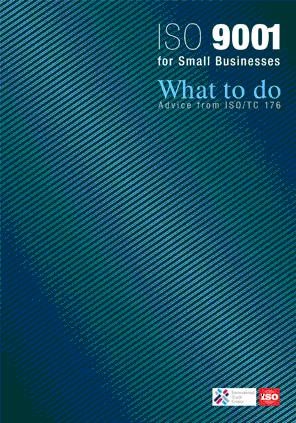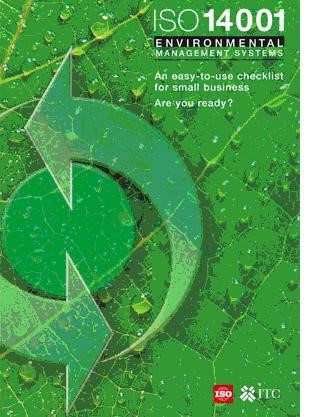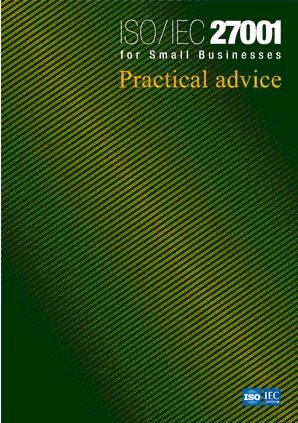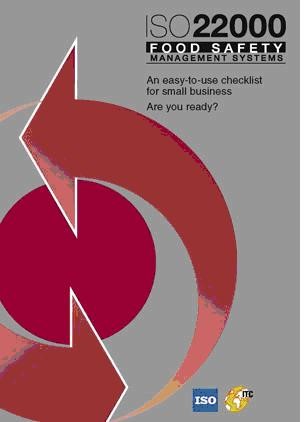
ISO 9001 for Small Businesses
Small organizations introduce quality management systems in order to save money, boost profits, attract more customers and satisfy market demand. Giving examples from different areas, the members of ISO/TC 176 have prepared for you some advice that will help you decide on where and how to start introducing the quality management system.
ISO 14001 Environmental Management Systems
ISO 14001, Environmental Management Systems, ensures equal environmental management results in all sizes of businesses. The handbook combined with a CD, helps small businesses design an efficient environmental management system based on ISO 14001. The handbook leads the business by its key steps to achieving environmental performance and helps in determining those areas for improvement that lead a small business to reduce its costs and save time.

ISO / IEC 27001 for Small Businesses
Taking into account the practical advice in this handbook, you will be in conformity with the information security standards and legislations. Information security will certainly maintain your reputation and competitiveness.
How to apply the ISO 22000 family of standards – Food safety management systems
"Is our food safe?", "Is there a system that could control and ensure food safety throughout the entire chain – from field to plate – and at the same time exclude all weaknesses on this path?" These are questions we ask ourselves more and more frequently. The handbook with CD on ISO 22000, which provides requirements for food safety management systems, is intended for all organizations in the food chain.
Economic benefits of standards
Still not sure? Read the two volumes of the magazine "Economic benefits of standards", which contain 21 international case studies on economic benefits of using standards based on research made in 19 countries throughout the world.CEN Study on European service standards and their impact on service users and providers
European standards have contributed to a considerable improvement in the quality and safety of goods over the last twenty years. Nevertheless, although standardization is increasingly being used in the field of services, the number of service standards is still very small in comparison with standards in the field of products. One of the factors hampering progress in the development of service standards is the lack of awareness from service stakeholders of standardization in general and what benefits it can bring to them.
This is the reason why, in January 2011, CEN decided to launch a study on the implementation of European services standards and their impact on service providers and users. The study, carried out by Technopolis, provides data and specific examples on the way in which existing European Standards have been used and highlight their impact on service providers and users.
The results of the study were published by CEN at the end of January 2012. In the framework of the study six case studies featuring specific businesses using standards in the area of diving services, funeral services, maintenance, furniture removal services, translation and passenger transport have been developed. One of the main conclusions of the study is that the most widespread and important benefits of service standards relate to the improvement of service quality and the ability to demonstrate this to customers, which in turn leads to higher levels of customer satisfaction. This is specially highlighted by SMEs.
Service standards are also providing significant benefits in enhancing understanding and communication through definitions/terminology, improved contractual relationships and improved transparency of service. According to the results of the survey carried out in the framework of the study, service standards are also bringing important benefits by helping service providers to meet legislative or regulatory requirements. A majority of users also indicate that they support cross-border trade and that they have seen improvements in their market share and profitability as a result of implementing service standards.
Some case studies of European service standards
- Leatherbarrows Removals and Storage Ltd. (UK) – Furniture removal activities – EN 12522 (1.98 MB )
- Nederlandse Onderwatersport Bond (Netherlands) – Scuba diving services – EN 14153 and EN 14413 (225 kB)
- Begravelses Service (Denmark) – Funeral services – EN 15017 (2.23 MB)
- Stora Enso (Sweden) – Maintenance – EN 13306 and EN 15341 (184 kB)
Publications
- CEN/CENELEC Guide 17 - Guidance on writing standards for the needs of micro, small and medium-sized enterprises (MSMEs). It includes strategies, instructions and recommendations for standard writers …
- Standardization for SMEs – Building on the benefits (970 kB) Standards definitely offer a vital competitive edge…
- Standards for business Henk J. De Vries, RSM Erasmus University (954 kB)
- Using standards to support growth, competitiveness and innovation - Guide on fostering and facilitating SME competitiveness through development and use of standards by means of EU Structural Funds
Links
E-learning on the benefits of involving SMEs in standardization. Also available in Slovenian.
Free information on standards – Contact Point
CEN/CENELEC SME TOOLBOX OF SOLUTIONS
At the touch of a button, get more information and better understanding of how using standards can benefit your business. The website shows how you can identify the right standards for your activity, how to share experiences with others, how to keep up to date, link with others, and how and why get involved in standardization processes...
European Small Business Portal, which compiles all the information provided by the EU on and for SMEs, ranging from practical advice to policy issues, from local contact points to networking links
SBS (Small Business Standards), new European association, which represents micro, small and medium-sized enterprises in the European and international standardization








